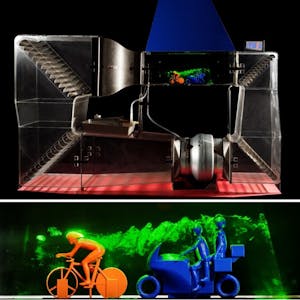Sports and Building Aerodynamics
COURSE ABSTRACT: Have we reached the boundaries of what can be achieved in sports and building design? The answer is definitely “NO”. This course explains basic aspects of bluff body aerodynamics, wind tunnel testing and Computational Fluid Dynamics (CFD) simulations with application to sports and building aerodynamics. It is intended for anyone with a strong interest in these topics. Key fields addressed are urban physics, wind engineering and sports aerodynamics.
COURSE CONTENTS:
The course consists of 6 weeks. The first 3 weeks are on fundamentals, the second 3 weeks on applications.
- Week 1: Basic aspects of fluid flow
- Week 2: Wind-tunnel testing
- Week 3: Computational Fluid Dynamics
- Week 4: Building aerodynamics
- Week 5: 100 m sprint aerodynamics
- Week 6: Cycling aerodynamics
COURSE UPGRADES:
In January-February 2017, the course will be upgraded/extended with:
- New modules on cycling aerodynamics
- Week 7: Climate adaptation of buildings and cities
- Week 8: Air pollution
If you want to take the upgraded/extended course, please wait with enrollment until mid February.
LECTURER:
The lecturer is Bert Blocken, professor at Eindhoven University of Technology in the Netherlands and KU Leuven in Belgium. He is a Civil Engineer holding a PhD in Building Physics. His main areas of expertise are urban physics, wind engineering and sports aerodynamics. He has published 126 papers in international peer-reviewed journals. He has received the 2013 Junior Award from the International Association of Wind Engineering and six best paper awards from the Elsevier ISI journal Building & Environment (2009, 2011, 2012) and at international conferences. According to the 2016 Academic Ranking of World Universities (Shanghai Ranking) & Elsevier, he is among the 150 most cited researchers world-wide both in the field of Civil Engineering and in the field of Energy Science & Engineering. Since Dec 2016, he is editor of the ISI journal Building & Environment and starting 2017, he is also associate editor of the ISI Journal of Wind Engineering & Industrial Aerodynamics. He is member of the editorial board of the ISI journals Building Simulation and Sports Engineering. He has acted as a reviewer for more than 70 different ISI journals. He is currently supervising a team of 4 senior researchers, 32 PhD students and 5 MSc students.
None
Syllabus
Syllabus - What you will learn from this course
Week 1
Introduction movies & Basic aspects of fluid flow
Week 2
Wind-tunnel testing
Week 3
Computational Fluid Dynamics
Week 4
Building aerodynamics
Week 5
100 m sprint aerodynamics
Week 6
Cycling aerodynamics
Week 7
Final quiz
Week 8
Peer-graded assignment
FAQ
When will I have access to the lectures and assignments?
Access to lectures and assignments depends on your type of enrollment. If you take a course in audit mode, you will be able to see most course materials for free. To access graded assignments and to earn a Certificate, you will need to purchase the Certificate experience, during or after your audit. If you don't see the audit option:
What will I get if I purchase the Certificate?
When you purchase a Certificate you get access to all course materials, including graded assignments. Upon completing the course, your electronic Certificate will be added to your Accomplishments page - from there, you can print your Certificate or add it to your LinkedIn profile. If you only want to read and view the course content, you can audit the course for free.
Is financial aid available?
Yes. In select learning programs, you can apply for financial aid or a scholarship if you can’t afford the enrollment fee. If fin aid or scholarship is available for your learning program selection, you’ll find a link to apply on the description page.
Reviews
Excellent demonstration of aerodynamics aspects in sports and building environments
Really intriguing and interesting course. The standard of the MOOC is exemplary. It tries to address many unconventional theories with perfectly validated studies. Highly recommended course.
Very good course to understand CFD simulations and its applications to evaluate wind effects around sports and building models
Very interesting. Engineer background will help to understand the contents. As architect I found it complex but very useful to get context and guidelines about CFD for buildings.
